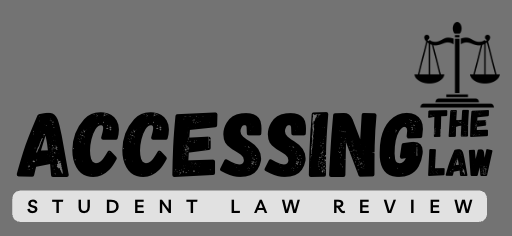Corporate Law: The Corporate Transparency Act
Written by Kurt Striegel III, Shriya Reddy, Ava Bob, and Giulia Mayhua Pezo
Edited by Anna Ramesh
What is the Corporate Transparency Act?
The Corporate Transparency Act known as CTA is a new act that was passed last year on January 1st 2024. According to the American Bar Association "is intended to provide law enforcement with beneficial ownership information for the purpose of detecting, preventing, and punishing terrorism, money laundering and other misconduct through business entities". To sum it up it is an act to make sure no corruption and illegal activity happens in businesses. Similar acts include a lot of state business laws but one to talk about is the New York Liability Company which is similar to an LLC that gives partnerships and builds a structure to make sure that a company meets its standards. They are similar because of partnerships that they had to make and to make to also regulate the businesses and that it meets the correct standards and no suspicion is going on.
A Beneficial Ownership Information (BOI) Report is documentation in cooperation with the Financial Crimes Enforcement Network (FinCEN) which is reported by companies, limited liability corporations, and other entities.
As of now, the timeline is set so that a company that was created or registered to do business before January 1, 2024, will have until January 1, 2025, to file its initial BOI report (Financial Crimes Enforcement Network). There are two categories of companies that must complete a BOI report: Domestic Reporting Companies (Corporations, LLCs, or established in the United States) and Foreign Reporting Companies (a foreign business entity registered to do business in any U.S. state or Indian tribe by such a filing) (Farm Credit East). There are 23 companies that are exempt from filing a BOI usually because they are monitored frequently by federal or state authorities.
What does this Act mandate?
Under this Act, all reporting companies must disclose their full legal name and any trade names or "doing business as" (DBA) names, as well as their primary business address, which for foreign based companies, would be their main U.S. operational site. All entities subject to this act must also provide a taxpayer identification number (TIN) and indicate the state or foreign country in which they are registered. They also must submit information regarding each beneficial owner, including their legal name, date of birth, residential address, identification number (found on a driver's license or passport), and an image of this identification document. The CPA defines a beneficial owner as an individual who either owns a minimum of 25% of the reporting company or exercises substantial control in the company's decision making.
New entities (companies formed on or after January 1, 2024) are mandated to provide details regarding the company applicants– the individuals responsible for registering the business. These details include their names, business or residential addresses, dates of birth, and an identification number (such as a driver's license or passport number), along with the jurisdiction that issued the provided identification documents. Companies established before this date are not required to report company applicant details, and are only instructed to submit company and beneficial owner information.
BOI disclosure primarily impacts small and privately operated businesses, such as LLCs or similar corporations that were created by filing with a U.S. secretary of state office. Foreign companies authorized to operate in the U.S. are subject to BOI reporting as well. Entities who already face extensive federal regulation, like publicly traded companies or tax-exempt nonprofits, are exempt from BOI disclosure.
The Department of the Treasury is strongly connected to the CTA as it administers and enforces the Act's reporting requirements. By utilizing BOI reports, the Treasury seeks to promote financial transparency and combat unlawful activities like money laundering, tax evasion, and terrorism financing. With Financial Crimes Enforcement Network (FinCEN) oversight, the federal government can track and analyze corporate ownership trends, thwarting the misuse of anonymous entities for illegal activities.
Since the CTA's enactment, discussions have emerged regarding potential amendments to its provisions. Future changes may include expanding the list of exempted parties, adjusting reporting timelines, or clarifying the definitions of beneficial ownership to eliminate ambiguities. Legislators also advocate for actions that streamline BOI reporting processes and enhance data protection measures to safeguard sensitive company information. The ongoing updates and regulatory directives from FinCEN and the Department of the Treasury will inform the evolution of the Act.
The Corporate Transparency Act brings transformative regulations to enhance ownership transparency and fight financial crime. It mandates that corporations reveal their beneficial ownership, increasing accountability and aiding law enforcement in tackling illegal activities. The Financial Crimes Enforcement Network (FinCEN), part of the Department of the Treasury, is crucial in enforcing these compliance measures. This Act significantly influences corporate governance, compelling companies to adhere to new legal standards. Future adjustments might clarify its scope and influence as implementation progresses, strengthening initiatives to prevent financial misconduct
Works Cited
"Beneficial Ownership Information." FinCEN.gov, December 2024. https://www.fincen.gov/boi-faqs#A_1.
Fraraccio, Miranda. 2023. "Corporate Transparency Act - What You Need to Know." CO. December 18.
https://www.uschamber.com/co/start/strategy/small-business-corporate-transparency-act.
Weaver, Austin. "What You Need to Know about Beneficial Ownership Information Reporting for Your
Business." What you need to know about beneficial ownership information reporting for your business, January 18, 2024. https://www.farmcrediteast.com/en/resources/todays-harvest-Blog/240118NeedtoKnowaboutBeneficialOwnershipInformationReporting.
"Who Is Exempt from the Corporate Transparency Act?" 2024. IncNow. November 8.
https://www.incnow.com/cta/cta-exemptions/.
"U.S. Beneficial Ownership Information Registry Now Accepting Reports." 2024. U.S. Department of the
Treasury. https://home.treasury.gov/news/press-releases/jy2015.
U.S. Chamber of Commerce. "Small Business and the Corporate Transparency Act." U.S. Chamber of
Commerce, February 23, 2023. https://www.uschamber.com/co/start/strategy/small-business-corporate-transparency-act.
Verrill. "Who Must Be Reported as Beneficial Owners of a Reporting Company?" Verrill Law, July 2023.
https://www.verrill-law.com/publications/who-must-be-reported-as-beneficial-owners-of-a-reporting-company/.

